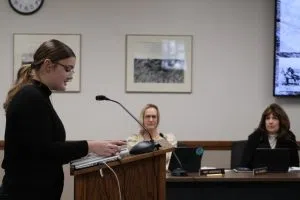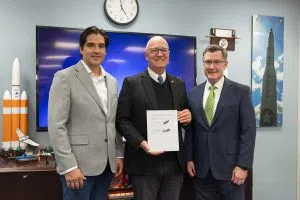 (Mary Steurer – North Dakota Monitor) – A bill to lower the price of insulin drugs and supplies for more North Dakotans attracted passionate discussion at a Thursday hearing before the House Government and Veteran Affairs Committee.
(Mary Steurer – North Dakota Monitor) – A bill to lower the price of insulin drugs and supplies for more North Dakotans attracted passionate discussion at a Thursday hearing before the House Government and Veteran Affairs Committee.
House Bill 1114 would set out-of-pocket costs for a monthly supply of insulin at $25 for the North Dakota commercial insurance market. It would also institute a $25 monthly cap for medical supplies used to administer insulin.
The new caps would affect North Dakotans on individual, small group and large group insurance plans within the fully insured market. The bill doesn’t apply to the self-insured market.
A group of advocates said the cap would be life-saving for people with diabetes, who depend on insulin to survive
Nina Kritzberger, 16, said living with Type 1 diabetes is to live a life of uncertainty. Though her family’s insurance plan covers part of her expenses, she doesn’t know what kind of coverage she’ll have as an adult.
“There’s one thing in the back of my mind that I think about every day: If this bill doesn’t pass, I might not be here in the future,” Kritzberger, who lives in Hillsboro, said Thursday.
Danelle Johnson of Horace said both she and her daughter, Danika, live with diabetes. She told lawmakers her family still spends thousands of dollars on diabetes-related expenses
“It’s been over $10,000 every year since my daughter has been diagnosed,” she said.
Representatives of insurance companies testified against the bill, arguing that the cap would merely shift costs to other groups, like insurers and employers.
“Instituting a copay cap is similar to putting a Band-Aid on a wound that will not heal,” Megan Hruby, speaking on behalf Blue Cross Blue Shield of North Dakota, told the committee. “It does nothing to address the underlying issue of affordability, as pharmaceutical companies are still free to charge whatever they want for insulin.”
Dylan Wheeler, head of government affairs for Sanford Health Plan, said the high prices may be a patent law or antitrust problem.
“If you cap the price of something, we’re not looking at the underlying issue,” Wheeler said. “We generally oppose mandates because it inhibits our ability to innovate and create unique plan designs for members.”
While it’s unclear exactly how many North Dakotans would be affected by the proposed cap, Wheeler estimated that the mandate would affect about a quarter of the state’s health insurance market.
“Mr. Wheeler, you’re well aware that we’re in North Dakota, and when you use the word ‘mandate,’ a percentage of the people in here start to freak out,” said Rep. Austen Schauer, R-West Fargo, who chairs the committee. “But then you try to weigh that to the cost of the Ninas of the world, and then you have a bit of a dilemma.”
The North Dakota Insurance Department offered neutral testimony on the bill. Chrystal Bartuska, life and health division director for the agency, introduced a minor amendment to the bill to make the language more consistent with the department’s code.
The committee did not take immediate action Thursday. Schauer asked Rep. Carrie McLeod, R-Fargo, to work with PERS and the North Dakota Insurance Department on the proposed amendment.
The insulin caps were already piloted for state employee health plans beginning in 2023.
Under state law, North Dakota must first test any health insurance mandates on the state employees before introducing it to the North Dakota commercial market.
The 2023 legislation that created the pilot program requires PERS to bring a follow-up bill this session extending price caps to the general state insurance marketplace.
The three largest manufacturers for the U.S. insulin market — Eli Lilly, Novo Nordisk and Sanofi — all recently lowered the cost of their insulin products.
Because of those price cuts, the PERS board found that the pilot program didn’t come at a significant cost to the state,
A study presented by PERS to the interim Employee Benefits Programs Committee found that continuing the caps for the 2025-2027 biennium would result in an estimated 0.12% increase in claims costs to the state insurance program, or roughly $1 million.
The fiscal note attached to bill House Bill 1114 estimates the cost to the state at about $834,000.
The study also reported that as of August, 24 states and Washington, D.C., had also implemented insulin price limits for state-regulated commercial health insurance plans.
New insulin caps went into effect Jan. 1 for Affordable Care Act-compliant individual and small group plans in North Dakota.









